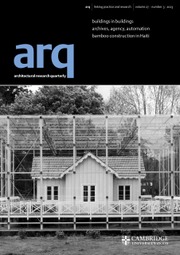No CrossRef data available.
Article contents
Twenty-one lessons learnt
Published online by Cambridge University Press: 04 April 2018
Extract
A number of years ago, my practice Sergison Bates was invited to take part in a competition for a housing project in north London. At some point in the competitive interview, I stated that every project we undertake is unique in the set of interests it investigates, and could be understood as a form of research. I still believe that this is true, although I would be cautious about making the same comment again in such circumstances. We did not win the competition and found out later that a number of members of the members of the jury took issue with my statement. They misconstrued it, thinking that what we had in mind was some form of speculative enterprise with implicit risks and an uncertain outcome, which they would be funding. I now understand the difficulty the client had. Naturally, they wanted to be assured that we had the experience and competence to deliver a building that would serve their needs and be fit for purpose.
When we set up in practice – at about the same time as arq was launched – Stephen Bates and I had learnt some things about building from working for a number of established architects in practice. When we formally founded our own practice, we accepted a future of uncertainty, although this was countered by great optimism on our part. Looking back, it is clear that a series of events that were wholly out of our control have shaped the practice we now have. Many of the projects we worked on in the early years took on issues for the first time, and this partly explains why it feels that we undertook more research then than we do now. I do, however, believe that we are constantly building upon a set of shared interests, and while the knowledge we have acquired through building is cumulative, our restless curiosity to explore new themes and ideas remains unchanged.
- Type
- Design
- Information
- Copyright
- Copyright © Cambridge University Press 2017


